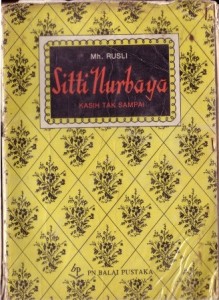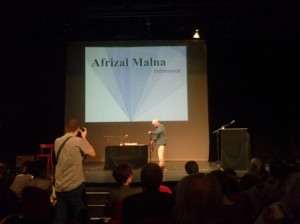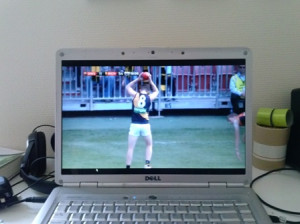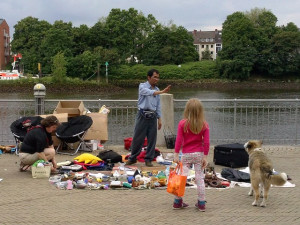The train for Utrecht left Leiden at 5:48am – eight minutes into the Greater Western Sydney – Richmond game. I was on my way to Bremen in northern Germany for the yearly Poetry on the Road festival: a friend of mine was performing, and, going there would also give me the opportunity to meet a friend who I hadn’t seen for a couple of years. A musicologist who had now finished his PhD and had become a professor. I wasn’t taking my computer with me; for it was a short trip and I could best make use of the time on the train through reading from paper and making notes in a paper notebook when necessary. I planned to avoid the news and social media so that I could watch the game in its entirety upon my return to Leiden. So, I wouldn’t check Twitter or the sports news apps. A kind of quiet time. Instead, I had with me a copy of Marah Rusli’s novel, Sitti Nurbaya: Kasih Tak Sampai (Sitti Nurbaya: Unrealised Love), first published in 1922. This edition has been republished by Lontar Foundation and translated by George A. Fowler – also a translator of Mandarin and Tagalog. It’s 300 pages and I am to review it for Christian Razukas at The Jakarta Post. I was ambitious and hoping to read 150 pages on the trips to and from Bremen. I almost made it – getting up to page 274.
I arrived in Bremen and checked into a hotel nearby. I went for a walk through the main old part of town: seeing the iconic statute that depicts the characters in the Brothers Grim fairy tale, The Town Musicians of Bremen. The Weser, which runs through the city, was home to a flea market. Goods arranged neatly and of little value it seems. The usual curiosities and the electric goods that may or may not work. Goods sold from the backs of vans. Further down the river, a group of young men were having a bucks party for one of their mates. They had painted their bodies yellow and dressed up in some kind of variation of a school uniform it seemed. Toddlers rode on fat plastic tricycles. Young girls strutted about in their Saturday afternoon costumes. It was hot and still; but soon enough the weather returned to being something closer to winter. A change of wind and then it rained from 4pm to past midnight. I walked with a friend from Hamburg University from one of Bremen’s cafes to the Shakespeare Theater company where Afrizal would be reading some of his poems, along with a dozen other poets. Les Murray was also at the festival, but, on this night, he was a part of another event.
Afrizal was given a long introduction. The host spoke long and enthusiastically in German about his work; he seemed to be giving a commentary, too. It seemed that no matter the degree of familiarity of the audience with the performing poets, all were equally respected. The audience trusted the judgement of the committee who had selected the poets. One of the organisers, Silke Behl, would later tell me that she indeed knew the means to attracting ‘big names’ to her festival. Afrizal, diminutive, gently walked onto the stage and slowly gave an introduction to his experience with Bremen. Most other poets launched straight into reading their poems with barely a ‘hello’. Silke translated his remarks about the sounds of birds, Bremen’s streets, and his own observations about how he writes. Afrizal said, ‘my poems are between constructing and deconstructing’. Or, ‘di antara susunan dan ketersebaran’. Afrizal, small, short and skinny, gave a resounding performance. He read his poems with the accomplishment of a stage actor; yet held on grimly to the paper on which they were printed. His voice rose and rose and rose. And in between each poem he spoke the only two words in English I have heard him ever speak, ‘next poem’. It was at these moments the audience would clap.
***
It’s too easy to be condescending to the Greater Western Sydney. They’re not in finals contention. They are the easy-beats of this season along with Brisbane Lions, it seems. Caroline Wilson though is also right to say that Richmond has been the great disappointment of 2014. Where the team was so-watchable during 2012 and 2013, the team has become so timid and scared of losing throughout the first eight matches of 2014. The bandwagon has been getting lighter and lighter each week. The season has seemed to be over before it started. There has been a very limited sense of excitement. The team themselves have been responsible for extinguishing the excitement, rather than having it done by the opposition. They haven’t come to play; they haven’t had their tales up; they haven’t seemed like they have wanted to be there. Many players have played at a level below from what they did in 2013: Houli, Grigg, Morris, Chaplin. Riewoldt, Jackson, Cotchin have played well. Deledio curiously injured. Rance injured off the footy field. Ivan injured. Hampson not proving himself to be an adequate replacement. Another so-it-goes moment in the life of the RFC.
Hardwick is generally an adequate media performer. He is chipper in the face of a loss, mildly praising in the face of a win. He always remains respectful of the opposition: sometimes boosting them a little too much. In the face of this unflattering 2-6 start, he has at times tried to fool journalists and fans by saying that the team is improving. Well, in that case, give us the 15-win season of 2013. At this stage, the team has been playing to lose. No shame in losing to good teams provided that they play in a manner in which winning could be possible. The losses to Western Bulldogs, Melbourne and Gold Coast showed no trace of a courageous game style or confident players. They were painful games to watch. The team seem determined to play beneath their opposition. Any game is losable and any game is winnable. And thus the team can lose by 5points to Geelong and also get easily accounted for by a re-emerging Melbourne: a team that had been an embarrassment to the competition early in the season and for the last several seasons. At least they have played to win recently. As if ‘playing to win’ needs to be stated literally. They were admirable in their defeat of Richmond. The Tiges were shameful.
But football turns quickly and us fans are just as willing to forgive as we are willing to criticise. We go to a game, or watch from afar, looking for some twists, some turns, some dash and some exuberance. We know what our players are capable of and we want more and more – always greedy. We love the risks the players take; and cringe when they play risk-free footy. Going into their shells invites defeat. Geelong’s play is one bullish movement forward. Their players have full confidence in one another to win the one-on-one battles. Putting the ball into a 50-50% situation is not even risky. They know their players will, more often than not, come out on top. For their fans, watching their team win has become tremendously humdrum. The beautiful spectacle of Kardinia Park under lights in the game on Friday night was not matched by a participative, rapturous crowd, who mostly watched in seemingly bored silence. Compare that crowd with that of the Adelaide oval: so loud that the siren wasn’t heard. This is the difference of a crowd that watches in anticipation of the rising great Port Adelaide or the Adelaide Crows who seem to thrill at one moment and flabbergast the next.
***
I persisted with Sitti Nurbaya throughout the journeys to and from Bremen. Indeed this is a quaint novel: a novel which seeks to teach its readers about how to behave and how to conduct themselves in love and towards their parents and towards such vague concepts of ‘tradition’ and ‘custom’. There is a beautiful young woman, a wayward but loving potential husband, a betrayed parent, a nasty old lecher, and a conflict between the Minang peoples of West Sumatra with the colonial powers regarding the imposition of a new tax law. The novel is a classic of Indonesian literature, but is largely known only through its dramatisation in a TV serial. Moreover, it’s a story which is so well known, of such a formulaic ‘unrealised love’ that the names of Sitti Nurbaya and Samsulbahri have become synonymous with hopeless, futile love.
 Secondhand love: Werder Bremen shirts on a Sunday morning
Secondhand love: Werder Bremen shirts on a Sunday morning
Perhaps I read the novel also to deliberately contrast this one kind of early modern Indonesian literature with the experience of meeting Afrizal once more, of hearing him perform once more. Some critics call his style postmodern: as if ‘postmodern’ has become so distinctly codified and simply yet another style. Afrizal has nothing to do with such antecedents. It is up to the reader to make his or her own trajectories and connections between writers and contexts. Here in Bremen, Afrizal was amongst his contemporaries from Nicaragua, Ukraine, Jamaica, Germany, The Netherlands and Ireland. Perhaps many could not understand the original Indonesian, or the translations in German; but the response to his work and style was based on the warmth he conveyed, the concentration of his performance, the manner in which he stood – alone with his piece of paper and his soaring, deep voice.
Saturday afternoon by the Weser




Ah, the tired old literary trope of a conflict with the colonial powers regarding the imposition of a new tax law! The breadth of your study is impressive and the way you can weave it amongst your football writing is wonderful. I am sadly ignorant of south-east Asia, thank you for introducing a small part of it.
So, Indonesian poetry, and travel through continental Europe with pen and paper, and literary festivals, and appraisals from afar on a football team and the way it is playing. Is pastiche part of the postmodern? I am so curious about our supporters, and how they support, and how they follow the game, and the way they thin about it – and your tidings from abroad can only add to this. I can see a journal developing. A transportation to a game, and to another place, and to a man whose head is in a book of Indonesian poetry, while also thinking about….
It is exotic, and I love it. I hope others get to read it.